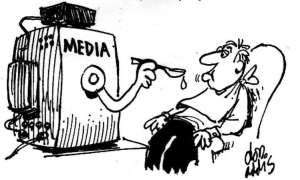Module 9: EOTO Terms & Concepts
Understanding Gatekeeping
Gatekeeping refers to the process by which information, resources, and opportunities are filtered and controlled by persons or groups in positions of authority. This concept goes well beyond a basic definition, touching many facets of society in significant ways.
Mechanisms and Implications
Gatekeeping functions through a variety of channels, including decision-making in the media, politics, education, and even social contexts. Media gatekeepers, such as editors and producers, determine what news is reported and how it is presented. In politics, gatekeeping can influence which candidates receive attention and which policies are advocated. Educational gatekeepers such as college admissions officers, have an impact on who is admitted to higher education. Individuals or groups practice social gatekeeping by controlling access to social circles, events, or information. While gatekeeping can improve quality and reliability by avoiding misinformation and upholding standards, it also has drawbacks. It might result in information silos, where only particular perspectives are reflected, reinforcing biases and limiting diversity. Gatekeeping can contribute to inequality by limiting marginalized groups' access to opportunities and resources.
Societal Impact
Societal Impact
Gatekeeping has a wide-ranging impact on society. In the media, gatekeeping influences public perception and discourse. Only telling specific stories has the potential to alter cultural norms and beliefs. For example, if the media consistently presents particular groups unfavorably, stereotypes and prejudice can be reinforced. In education, gatekeeping influences who have access to great education and, as a result, better job possibilities. This can exacerbate social and economic disparities. Political gatekeeping can limit democratic participation by marginalizing specific views and perspectives, compromising the representativeness of political institutions.
Differential Impact on Society
Gatekeeping has distinct effects on different areas of society. Gatekeeping can perpetuate privilege or increase poverty for both rich and poor people. Wealthy people generally have better access to gated resources like high education and important networks, but the poor may be excluded. Age can also be a factor. Older people may occupy gatekeeping roles due to their experience and established networks, but younger people may struggle to overcome these obstacles. However, in the digital age, younger generations are discovering new ways to circumvent old gatekeepers via social media and online platforms. Gender and sexuality are also important considerations. Women and LGBTQ+ people frequently encounter barriers in male-dominated sectors or traditional areas, restricting their options and visibility. Conversely, efforts to confront these gatekeepers have resulted in increased advocacy and representation for these groups.
Differential Impact on Society
Gatekeeping has distinct effects on different areas of society. Gatekeeping can perpetuate privilege or increase poverty for both rich and poor people. Wealthy people generally have better access to gated resources like high education and important networks, but the poor may be excluded. Age can also be a factor. Older people may occupy gatekeeping roles due to their experience and established networks, but younger people may struggle to overcome these obstacles. However, in the digital age, younger generations are discovering new ways to circumvent old gatekeepers via social media and online platforms. Gender and sexuality are also important considerations. Women and LGBTQ+ people frequently encounter barriers in male-dominated sectors or traditional areas, restricting their options and visibility. Conversely, efforts to confront these gatekeepers have resulted in increased advocacy and representation for these groups.
Gatekeeping has an impact on both personal and generational experiences. For my generation, digital gatekeeping is a major concern. While social media platforms democratize content creation, they also serve as gatekeepers, controlling visibility and engagement through algorithms. This influences how we obtain information, develop communities, and engage in social and political discourse. For my family and friends, gatekeeping may take the form of educational and professional opportunities. Understanding and overcoming these hurdles is critical to accomplishing personal and group goals. Being aware of gatekeeping mechanisms allows us to challenge and bypass them, resulting in a more inclusive and equal society.
Gatekeeping is a complex subject with far-reaching repercussions for civilization. While it can keep standards and order, it also reinforces inequality and limits variety. Understanding gatekeeping allows us to recognize and challenge these barriers, resulting in a more inclusive and equitable world for all members of society. By teaching about gatekeeping, we can help people traverse and overcome these barriers, creating more opportunities and equity for future generations.


Comments
Post a Comment